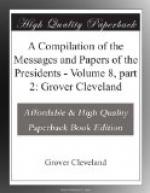They were permitted to select a new location for
themselves in the Indian Territory, the Quapaw Reserve,
to which they had first been taken, being objectionable
to them. They chose a tract of country on the
Arkansas River and the Salt Fork northwest of the
Pawnee Reserve. I visited their new reservation
personally to satisfy myself of their condition.
The lands they now occupy are among the very best
in the Indian Territory in point of fertility, well
watered and well timbered, and admirably adapted
for agriculture as well as stock raising. In
this respect their new reservation is unquestionably
superior to that which they left behind them on
the Missouri River. Seventy houses have been
built by and for them, of far better quality than
the miserable huts they formerly occupied in Dakota,
and the construction of a larger number is now in
progress, so that, as the agent reports, every Ponca
family will be comfortably housed before January.
A very liberal allowance of agricultural implements
and stock cattle has been given them, and if they
apply themselves to agricultural work there is no
doubt that their condition will soon be far more prosperous
than it has ever been before. During the first
year after their removal to the Indian Territory
they lost a comparatively large number of their
people by death, in consequence of the change of
climate, which is greatly to be deplored; but their
sanitary condition is now very much improved.
The death rate among them during the present year
has been very low, and the number of cases of sickness
is constantly decreasing. It is thought that
they are now sufficiently acclimated to be out of
danger.
* * * * *
A committee of the Senate, after a very full investigation of the subject, on the 31st of May, 1880, reported their conclusions to the Senate, and both the majority and minority of the committee agreed that “a great wrong had been done to the Ponca Indians.” The majority of the committee say:
* * * * *
Nothing can strengthen the Government in a just policy to the Indians so much as a demonstration of its willingness to do ample and complete justice whenever it can be shown that it has inflicted a wrong upon a weak and trusting tribe. It is impossible for the United States to hope for any confidence to be reposed in them by the Indians until there shall be shown on their part a readiness to do justice.
The minority report is equally explicit as to the duty of the Government to repair the wrong done the Poncas. It says:
* * * * *




